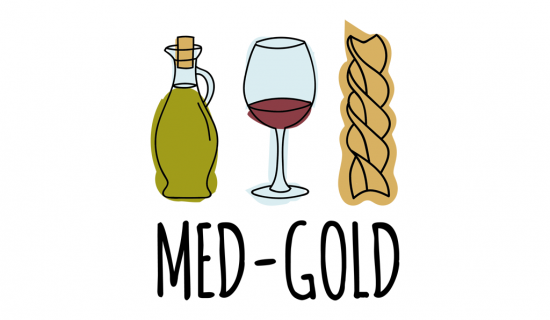Progetto MED-GOLD
Turning climate-related information into added value for traditional MEDiterranean Grape, OLive and Durum wheat food systems
MED-GOLD is a four-year research and innovation project funded by Horizon 2020, the European Union’s Framework Programme for Research and Innovation. The project is led by ENEA (Italian National Agency for New Technologies, Energy and Sustainable Economic Development), and the project partnership includes Barcelona Supercomputing Center (Spain), Barilla (Italy), BeeToBit (Italy), National research Council (Italy), DCOOP (Spain), ec2ce (Spain), GMV Aerospace (Spain), Horta (Italy), Joint Research Center (European Commission), Met Office (UK), National Observatory of Athens (Greece), Sogrape Vinhos (Portugal), Universidad Militar Nueva Granada (Colombia), University of Leeds (United Kingdom), University of Thessaly (Greece).The kick-off meeting of the project was held at Eataly Rome on 11 and 12 December 2017.The MED-GOLD project will demonstrate the proof-of-concept for climate services in agriculture by developing case studies for three staples of the Mediterranean food system: grape, olive and durum wheat. Agriculture is primarily driven by weather and climate, and future climatic conditions will further increase its vulnerability to crop failure and pest damage. Nowhere in the globe will this have consequences as dramatic as in the Mediterranean Basin — a hot spot of global change where higher than average projected climate change threatens an extremely rich and intertwined biological and cultural diversity, and will increase its vulnerability to natural hazards including biological invasions. The challenge for this region is how to increase the resilience of this complex ecological, economic, and cultural heritage of global relevance in an era of decreasing resources and climate change.Climate services, understood as the transformation of climate-related data and other information into customised products (e.g., projections, trends, advice on best practices, and any other climate-related service that may be of use for the society), have the potential to support the transition towards a climate-resilient and low-carbon society. Developing a capacity for climate services that can inform decision-making in agriculture is therefore a priority both in Europe and worldwide, as agriculture is directly affected by climate variability and change. The long-term goal of this project is to make European agriculture and food systems more competitive, resilient, and efficient in the face of climate change.The cumulative added value of MED-GOLD will range from enhancing agricultural management to supporting and informing policy-making at the Mediterranean, European and global levels. This is because olive, grape, and durum wheat are grown across the globe and produce the raw materials for global food commodities such as olive oil, wine and pasta. These in turn, are key staple foods of the Mediterranean diet with demonstrated potential for contrasting the increasing homogeneity in global food supplies with important food security implications and significant health benefits, and for reducing the ecological footprint of the global food system.The diverse, multidisciplinary MED-GOLD partnership enables suppliers/purveyors and users to develop climate services jointly in close collaboration — a key challenge for achieving climate services with high added-value. Project partners that are world leaders in the wine, olive oil, and pasta sectors will lead the three Mediterranean case studies. Extension of the MED-GOLD approach will be tested for coffee — the world’s most important agricultural commodity.

